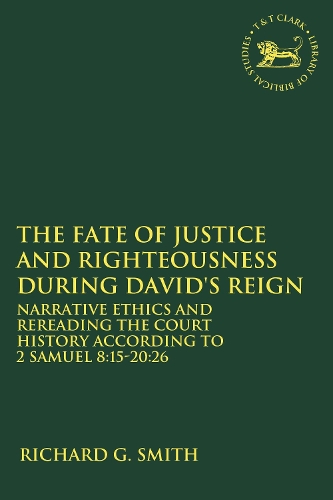
The Fate of Justice and Righteousness during David's Reign: Narrative Ethics and Rereading the Court History according to 2 Samuel 8:15-20:26
(Paperback)
Available Formats
Publishing Details
The Fate of Justice and Righteousness during David's Reign: Narrative Ethics and Rereading the Court History according to 2 Samuel 8:15-20:26
By (Author) Prof. Richard G. Smith
Bloomsbury Publishing PLC
T.& T.Clark Ltd
27th June 2019
United Kingdom
Classifications
Tertiary Education
Non Fiction
Criticism and exegesis of sacred texts
Old Testaments
222.4406
Physical Properties
Paperback
294
Width 154mm, Height 232mm, Spine 18mm
440g
Description
This work argues that 2 Sam 8:15-20:26 is a literary unit designed to show how David and his house failed to establish "justice and righteousness" during David's reign over all Israel. After an introductory chapter and a chapter on critical methodology the rest of the work is a close reading of 2 Sam 8:15-20:26 that pays special attention to narrative ethics. Chapter 3 makes a case for reading 2 Sam 8:15-20:26 as a coherent literary unit reflecting an ethical world-view grounded in kindness and having as its main theme "the failure of justice and righteousness to be established during David's reign." Chapter 4 presents a case for reading 2 Sam 8:15-10:19 as an account of the beginnings of justice and righteousness during David's reign in which David's kindness towards Mephibosheth is presented as analogous to a Mesopotamian royal declaration and was performed as an inaugural act of charity upon David's ascent to the throne.
Reviews
"The first manifestation of this study was as a 2000 doctoral dissertation at the University of Cambridge focusing on the characterization of Joab in the passage. Scholars are falling away from the hypothesis that this part of 2 Samuel and 1 Kings 1-2 together form a defense of Solomonic succession, he explains, but no paradigm has risen to replace it. In that vacuum, he focuses on Samuel alone, and its expression of values as a contribution to exploring the overall ethics of the Old Testament. His topics include justice and righteousness as ancient Near Eastern ethical ideal and hermeneutical constructs, redefining the court history according to the passage, reading it as the beginnings and corruption of justice and righteousness, the perversion of justice and righteousness in the Absalom affair, and the death of justice and righteousness with David's return and Sheba's secession." -Eithne O'Leyne, BOOK NEWS, Inc.
Indeed, [the author's] evaluation of David's reign through the lens of "justice and righteousness" and his close reading of these chapters of 2 Samuel are the real strengths and benefits of his book. -- Hebrew Studies, Volume LII
Author Bio
Richard G. Smith is Associate Professor of Biblical Studies at Taylor University.
